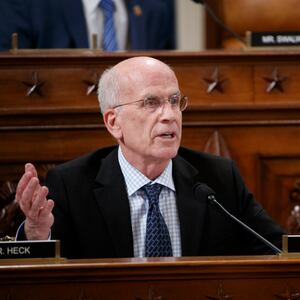The Democrats have kept control of the House of Representatives, but no one’s popping any champagne.
It will be a smaller, louder, and perhaps more ideologically volatile majority than what Speaker Nancy Pelosi (D-CA) has led over the last two years. And it could be full of political tripwires for her—and for a possible President Joe Biden—if they’re in the position of governing while Republicans retain their grip on the Senate.
A slew of moderate lawmakers, whose wins in the 2018 midterms handed the gavel again to Pelosi, have lost or are on track to lose their seats. Meanwhile, several establishment Democrats are set to be replaced by staunch progressives, shifting Democrats’ political center of gravity further left in the lower chamber of Congress.
ADVERTISEMENT
Democrats came into Tuesday optimistic that the party would actually expand its House majority by picking off GOP-held seats in suburbs and rural areas, which would have preserved the centrist wing’s powerful sway in the caucus. Those hopes have evaporated.
This, in short, was not the flock Pelosi was expecting. Instead, the party is left to figure out how such a seemingly promising election year went south, with Democrats spending Wednesday blaming Donald Trump, Pelosi and her leadership team, and each other in order to explain what happened. Democrats in the moderate and progressive wings in the party, in particular, traced the disappointing 2020 result to the other side’s flaws, and for many, long-simmering concerns about the political sensibilities of the party’s tenured leadership bubbled up to the surface.
Those battle lines are forming just as it seems that the common enemy who caused the temporary truce in Democratic internal warfare, Trump, is headed for defeat. Democrats’ intra-party political differences, once on the back burner, could again roar into view as the party’s margin of error for legislation in the House grows slimmer.
“It’s a little early to figure out what that’s going to feel like,” said Rep. Dan Kildee (D-MI), a member of House Democratic leadership. Kildee allowed that it was possible that the absence of Trump could flare up the party’s fault lines on key issues. “There are a lot of unanswered questions,” he told The Daily Beast. “I think we will be focused on the possible, and finding out what is possible, what is the next step in this long march to more a perfect union, rather than what do we have to do to prevent its destruction.”
For now, however, there is a lot of frustration and anger within the party’s ranks. Democratic aides described a downcast mood among members and staffers on Wednesday as the new House map grew clearer. One aide predicted that a backlash was brewing that could fuel a stronger challenge to Pelosi and her leadership team than the ones that have fizzled out in years past.
Internally, top House Democrats down to some in the rank-and-file are furious at Rep. Cheri Bustos (D-IL), the leader of the party’s House campaign arm, for the disappointing outcome, congressional sources told The Daily Beast.
“The knives are out for Cheri,” said a Democratic aide, who called her the “most obvious scapegoat.”
But some Democratic lawmakers insist there was only so much that Bustos, or anyone, could do this year. Kildee said that it was the “atmospherics of 2020”—high turnout for Trump in key districts—that hurt House Democrats, not any particular strategic missteps.
“All of us didn’t quite expect this particular set of atmospherics. I think that’s what that was about,” said Kildee. “What we would have done is pretty much what we did.”
Party strategists like Kristen Hawn, however, are looking at the results Wednesday and seeing a reckoning—arguing that Democrats need to do some soul-searching and seriously sharpen their messaging around what it is they’re exactly for.
“We had all the money in the world,” said Hawn, a former top aide to the moderate Blue Dog Coalition, referring to the strong fundraising from Bustos’ Democratic Congressional Campaign Committee and from individual candidates. “It was incredibly disappointing.”
But Hawn voiced frustration with the caucus’ more liberal members, who she suggested made it much easier for the GOP to stick the “socialist” label that appeared to damage some endangered incumbents in places like south Florida. “As much as our members were doing everything right, the party was getting in the way,” she said.
Progressives, meanwhile, saw in the results a repudiation of moderate politics and Pelosi’s iron grip on House Democrats.
“Nancy Pelosi is very bad at messaging and strategy, and extremely good at controlling her caucus,” said a strategist in the party. “That’s a bad combination when everyone defers to her unexplainable strategy on coronavirus relief and then Democrats lose seats everywhere to a party that just killed 200,000 people and lost millions of jobs. It’s malpractice, and we just keep following her. It makes no sense.”
Most of the roughly 40 Democratic lawmakers in competitive elections, known as “frontliners,” entered Tuesday heavily favored to keep their seats, even in districts that Trump carried easily in 2016. In fact, even some Republicans were privately bracing for the Democratic majority to grow by flipping even more seats deep in GOP territory.
But as results rolled in, the blue wave receded—big time. As of Wednesday afternoon, nearly all of the Democrats running to keep seats Trump won by 10 or more points four years ago had lost. It was not shocking that two Democrats in the deepest Trump turf, Reps. Kendra Horn (D-OK) and Anthony Brindisi (D-NY), were defeated by GOP rivals.
The political pain spread across the Democratic caucus as the night went on, however. Rep. Abby Finkenauer (D-IA), one of Biden’s youngest elected endorsers and considered to some as a centrist contrast to millennial progressive Rep. Alexandria Ocasio-Cortez (D-NY), was defeated by Ashley Hinson in northeastern Iowa. Rep. Joe Cunningham (D-SC), another young moderate, fell short to Nancy Mace in South Carolina in a race many Democrats thought he’d win. And Rep. Xochitl Torres Small (D-NM), who pulled off a major upset in rural New Mexico just two years ago, lost decisively to Republican Yvette Herrell.
So it went, from upstate New York to rural Minnesota to south Florida—where two incumbents in districts Hillary Clinton carried tanked alongside Trump’s wave in the region. While the GOP has been projected to flip seven seats, Democrats have flipped just two, both in North Carolina, and only because a redistricting order reworked the state’s map.
While the moderates dropped, several progressives cemented gains they made earlier in the year. Cori Bush of Missouri and Jamaal Bowman of New York, both backed by Justice Democrats, are officially headed to the House, having defeated longtime incumbents in primaries earlier this year. They’re expected to join forces with the four current members of the “Squad,” who also all won easily. And other members-elect, like Mondaire Jones and Ritchie Torres of New York, are also poised to bring very progressive politics to the caucus.
Despite the loss of several moderates, the caucus is not going to rapidly shift leftward, as a number of safe, tenured moderates and center-left Democrats hold sway and leadership.
But aides aligned with the progressive wing of the party are expecting this new energy to successfully push major legislation to the left—a key objective for the Congressional Progressive Caucus, which scored some wins in the last Congress but came up short in the eyes of some members in party fights over issues like immigration and health care. The original members of the Squad have not been shy about withholding their votes for legislation they believe is good but not great, and the new arrivals could behave similarly. Those votes will matter if the Democratic majority is shaved off by a number of seats.
In a letter to Democratic lawmakers on Wednesday evening, Pelosi framed the results as positively as she could. Hailing what she called a “clear choice” from voters for Biden, the speaker promoted a House majority that would help him enact their shared agenda.
“Though it was a challenging election, all of our candidates—both Frontline and Red to Blue—made us proud,” wrote Pelosi, referring to the DCCC’s programs for candidates in competitive races. “Our discipline in building a massive battlefield proved essential in keeping the Majority. Our success enabled us to win in our ‘mobilization, messaging and money,’ forcing Republicans to defend their own territory.”
Most Democrats can’t point to one specific thing—other than a more Trump-favorable environment than they expected—to explain the losses. But some have wondered if another COVID-19 stimulus bill might have helped.
For months, Pelosi had gone back and forth with Treasury Secretary Steve Mnuchin, haggling over a sweeping second round of pandemic relief. With the two sides seemingly stuck over the price tag—Pelosi, backed by much of her caucus, wanted at least $2 trillion—pressure mounted on her in the waning days of the 2020 campaign to accept the Trump administration’s offer of $1.8 trillion instead.
Senate Majority Leader Mitch McConnell (R-KY), who wanted to pass a bill a fraction of the size, was always going to be a major impediment to such a deal. But that didn’t stop some vulnerable Democrats from calling on leadership to deal with the administration.
In caucus calls, The Washington Post reported, lawmakers such as Rep. Abigail Spanberger (D-VA) urged a stimulus deal before Nov. 3, warning that they needed to deliver something economically significant to their constituents. Spanberger is currently locked in a too-close-to-call race in her purple Virginia district.
In mid-October, The Daily Beast reported that a trickle of members had privately discussed pushing her to take Mnuchin’s offer. And a handful of progressives, including Rep. Ro Khanna (D-CA), made their requests more public, citing the urgent need to provide relief for struggling Americans well before Biden would hypothetically take office.
Looking back, some Democrats now say that approving a stimulus plan—or even the appearance of a deal with the administration—might have provided a much-needed boost to vulnerable incumbents like Spanberger.
An aide to a frontline Democrat who won on Tuesday told The Daily Beast that the first round of stimulus—the CARES Act, which passed in March—was an essential component of persuading voters that the Democrat deserved another term.
“We were successful on those really local, COVID-specific wins,” said the aide, referencing the Paycheck Protection Program that injected hundreds of billions of dollars into small businesses. “We heard about it over and over again.”
One Democratic aide said that a pre-election deal would’ve helped dispel even further the GOP campaign talking points that moderate Democrats were aligned with Ocasio-Cortez or the “socialist” wing of the party.
Kildee, for his part, said he’s “worn out” on Democrats blaming Democrats for things he argues Republicans are responsible for. “I can see someone say it would have been better if we had gotten [a stimulus],” he said. “The Republicans were never going to agree to a stimulus.”
It’s not lost on many Democrats that this 2020 result they did not expect only increases the stakes for the bipartisan dealmaking that hasn’t happened for months: a divided Congress with narrower majorities in both chambers will be under immense pressure to produce a new COVID relief bill, no matter if Biden or Trump wins.
“We’re going to have to negotiate,” said Hawn. “It might be kind of a healthy exercise in democracy, the way things have shaken out.”









